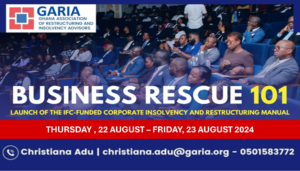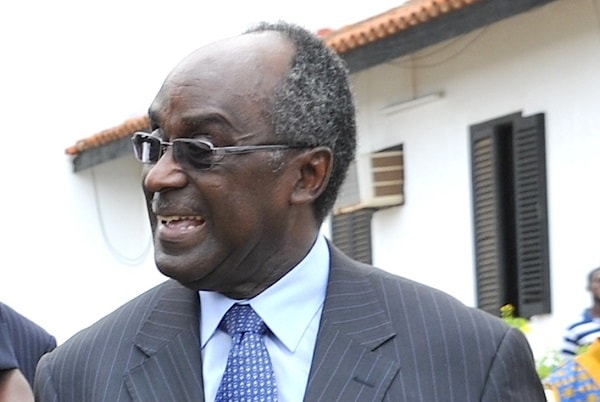By Justice S K Date(Prof)
This article is an edited reproduction of the original paper prepared and delivered at the inaugural Annual Public Lecture in honour of the late Kojo Bentsi-Enchill, organised by the Bentsi-Enchill, Letsa and Ankomah law firm.
INTRODUCTION
Last week the historical context and development of the Corporate Insolvency and Restructuring Act (CIRA) insolvency law in Ghana was explored and began teasing out its key features. Today’s article completes last week’s discussion highlighting the important features the operation of CIRA for creditor/investor confidence and business rescue.
The court does not manage the day-to-day conduct of the proceedings
Under CIRA, the court does not manage the day-to-day conduct of administration proceedings. Section 68 of CIRA makes it clear that the role of the Court is to supervise an administrator or restructuring officer. This implies that the day-to-day management of the administration or restructuring is the responsibility of the administrator or restructuring officer and not of the court.
Under the section, the Court may make any order that it considers appropriate, where the Court is satisfied that the management of the business, property or affairs of the company by an administrator or a restructuring officer is prejudicial to the interests of a creditor or shareholder of the company or the conduct of an administrator or a restructuring officer has been or will be prejudicial to the interests of a creditor or shareholder.
The conduct of the proceedings is entrusted to an office-holder.
Under CIRA, an office-holder is either the administrator or the restructuring officer. The officeholder is entrusted with the conduct of proceedings.
The period of administration begins as soon as an administrator is appointed. The administrator then takes control of the business, property and affairs of the company.
He or she is required to investigate the affairs of the company and consider possible ways of salvaging the business of the company in the interests of creditors, employees and shareholders. The administrator has the duty to carry on the business of the company and to manage the property and affairs of the company to salvage the business of the company in the interests of creditors, employees and shareholders.
The administrator is authorised to terminate, or dispose of, the whole or part of the business of the company and may dispose of any of the properties of the company. In addition, the administrator may perform any other function, and exercise any other power, that the company or any of its officers could perform or exercise, if the company were not in administration .
Only a qualified insolvency practitioner can act as the office-holder (unless the official receiver is acting as liquidator)
Insolvency practitioners are highly regulated and office-holder’s failure to conduct the proceedings in accordance with prescribed standards exposes him/her to disciplinary action in addition to legal liability. The Ghanaian regulatory regime also has this characteristic of tight regulation. At least the law in the books sets out a scheme of high regulation.
CIRA provides for the establishment of a division in the Office of the Registrar of Companies, to be known as the Insolvency Services Division. Among the functions of this Division is the regulation of insolvency practice under CIRA and the Companies Act, 2019 . The Division is also charged with the responsibility of overseeing the administration, restructuring and insolvency proceedings of companies.
The Registrar of Companies is required to keep under review the conduct and performance of insolvency practitioners . Insolvency practitioners are required to obtain professional indemnity insurance . The Act gives the Registrar power to investigate errant insolvency practitioners.
Office-holders have special powers and privileges to enable them to perform their functions
CIRA gives the administrator power to investigate the business, property, affairs and financial circumstances of the company and to form an opinion as to whether it will be in the interest of the creditors for the company to execute a restructuring agreement; to end the administration; or to go into liquidation . The administrator exercises these powers during a moratorium.
To enable an administrator to exercise the investigative powers vested in him or her, the administrator is given the same extensive powers as are vested in the official liquidator to obtain documents and information .
At the first meeting of creditors, the creditors must establish a committee of creditors, if they decide not to replace the administrator . Subsequently, the committee of creditors has the function of advising the administrator on matters relating to the administration and considering reports laid before it by the administrator. Its function also includes approving the remuneration and other terms of engagement of the administrator.
A principal duty of the administrator is to convene a watershed meeting of the committee of creditors after the first meeting. At this meeting, the administrator is required to set out his or her reasoned opinion on whether it is in the interest of the creditors of the company for the company to execute a restructuring agreement; or for the administration to end; or for the company to be placed in liquidation.
Decisions taken at the watershed meeting are crucial for the course of the administration. If the committee of creditors resolves that the company should execute a restructuring agreement, it becomes the responsibility of the administrator to prepare a draft of the restructuring agreement.
A restructuring agreement, if approved by the Committee of Creditors, has to be executed between the company and the restructuring officer. After approval of the restructuring agreement by the Committee of Creditors, the administrator is transformed into the restructuring officer, unless the Committee decides to appoint another person.
The appointment of a restructuring officer is irrevocable, except by order of Court . The restructuring officer is responsible for the implementation of the restructuring agreement. It is the restructuring agreement which gives the distressed company an opportunity for rehabilitation.
CIRA prescribes that a restructuring agreement shall include fresh capital, raised after the commencement of the administration.
Among the other terms statutorily required to be in the restructuring agreement are: an indication of who the restructuring officer is; funding for the agreement; the property of the company available to pay creditors; the nature and duration of any moratorium period for which the agreement provides; the extent to which the company will be released from the liabilities of the company; the conditions for the agreement to come into operation; the order in which the proceeds of realisation of the property of the company will be distributed among creditors who are bound by the agreement; and so on .
Creditors’ interests are paramount; creditors are treated as a class and individual rights within the proceedings must be exercised consistently with the interests of the class.
The role of the Committee of Creditors at the watershed meeting is illustrative. They are the body with authority to determine whether the administration proceeds to the restructuring phase or it is terminated for immediate liquidation to take place.
The administrator is also required to report, to the Committee of Creditors, matters that relate to the administration as and when the Committee reasonably requires.
However, the Committee is forbidden from giving directions to the administrator . There is caselaw in England to the effect that once a company is insolvent, the interests of creditors override those of shareholders .
Although there is no express language in CIRA which makes the creditors’ rights class rights, Ghanaian courts may find it useful to follow the English courts in treating the creditors’ rights as class rights. The English courts have regarded the concept of insolvency proceedings as a class remedy .
This notion of a class remedy is a judicial construct derived from the provisions of the relevant legislation. Thus, for instance, Harman J has explained that construct as follows, in Re a Company (No. 001573 of 1983) :
“On a petition in the Companies Court in contrast with an ordinary action there is not a true lis between the petitioner and the company which they can deal with as they will. The true position is that a creditor petitioning the Companies Court is invoking a class right …and his petition must be governed by whether he is truly invoking the right on behalf of himself and all others of his class rateably, or whether he has some private purpose in view.”
The heavy lifting and day-to-day decision-making should be left with the administrator and the restructuring officer and the Court should exercise its general power of intervention only to resolve disputes arising from the proceedings being administered by the administrator or restructuring officer and to determine issues of law. Commercial judgment over the proceedings should be exercised by the administrator or restructuring officer and not by the Court.
Other aspects of the regulatory regime of CIRA
The last common characteristic listed by Hamish Anderson, namely that there is a common distribution scheme (which applies unless the creditors collectively contract out by means of a company voluntary arrangement (CVA) or Companies Act scheme of arrangement), does not appear to be a feature of Ghanaian law and therefore will not be discussed.
CONCLUDING OBSERVATIONS
The enactment of CIRA is an important step in establishing a rescue culture in relation to corporate enterprises in Ghana. A rescue culture is beneficial to the country because it promotes the saving of corporate businesses which are worth more to the economy if preserved as going concerns rather than broken up and sold piecemeal in a liquidation.
This article is an edited reproduction of the original paper prepared and delivered at the inaugural Annual Public Lecture in honour of the late Kojo Bentsi-Enchill, organised by the Bentsi-Enchill, Letsa and Ankomah law firm.
Prof Date is a retired Justice of the Supreme Court of Ghana, retired Special Adviser (Legal) at the Commonwealth Secretariat in London, former Professor of Law and Member of the Governing Council of GARIA











